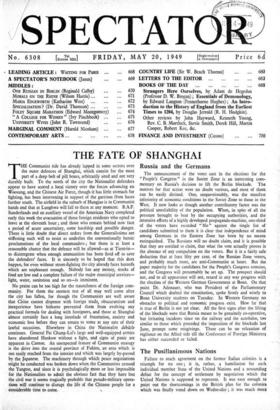THE FATE OF SHANGHAI
THE Communist tide has already lapped in some sectors over the outer defences of Shanghai, which consist for the most part of a deep belt of pill boxes, arbitrarily sited and not very durably built. To the north of the city the Nationalist defenders appear to have scored a local victory over the forces advancing on Woosung, and the Chinese Air Force, though it has little stomach for fighting, has been intervening in support of the garrison from bases further south. The airfield in the suburb of Hungjao is in Communist hands and that at Lunghwa will fall to them at any moment. R.A.F. Sunderlands and an auxiliary vessel of the American Navy completed early this week the evacuation of those foreign residents who opted to leave at the eleventh hour ; and those who remain behind now face a period of acute uncertainty, some hardship and possible danger. There is little doubt that direct orders from the Generalissimo are stiffening such will to resist as underlies the conventionally heroic proclamations of the local commanders ; but there is at least a reasonable chance that the defence will be allowed—as at Tientsin— to disintegrate when enough ammunition has been fired off to save the defenders' faces. It is sincerely to be hoped that this does happen, for even without street-fighting the city already faces hazards which are unpleasant enough. Nobody has any money, stocks of food are low and a complete failure of the major municipal services— light, water, sanitation and so on—is imminent.
No praise can be too high for the staunchness of the foreign com- munity. For them the sternest test of all may well come after the city has fallen, for though the Communists are well aware that China cannot dispense with foreign trade, obscurantism and inexperience have hitherto prevented them from evolving any practical formula for dealing with foreigners, and those at Shanghai almost certainly face a long interlude of frustration, anxiety and economic loss before they can return to some at any rate of their lawful occasions. Elsewhere in China the Nationalist clahicle continues. General Pai Chung-Lsi's large and well-equipped armies have abandoned Hankow without a fight, and signs of panic are apparent in Canton. An unexpected feature of Communist strategy is the drive into the coastal province of Fukien, an area which is not easily reached from the interior and which was largely by-passed by the Japanese. The machinery through which peace negotiations might be conducted was broken down when the Communists crossed the Yangtse, and since it is psychologically more or less impossible for the Nationalists to admit the obvious fact that they have lost the civil war it seems tragically probable that pseudo-military opera- tions will continue to disrupt the life of the Chinese people for a considerable time to come.










































